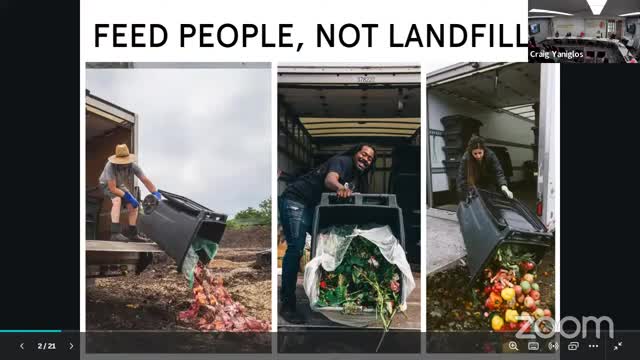Community composting initiative transforms food waste into soil solutions
August 22, 2024 | Brecksville-Broadview Heights City, School Districts, Ohio
This article was created by AI summarizing key points discussed. AI makes mistakes, so for full details and context, please refer to the video of the full meeting. Please report any errors so we can fix them. Report an error »

In a recent government meeting, representatives from Rust Belt Riders presented their innovative approach to tackling food waste in the community. The organization, which began a decade ago as a bicycle-based initiative in Cleveland, has evolved into a worker cooperative with 38 professionals dedicated to diverting food waste from landfills and transforming it into valuable compost.
The co-founders highlighted the alarming statistic that 40% of food produced in the United States is wasted, contributing significantly to greenhouse gas emissions, particularly methane, which is 25 times more potent than carbon dioxide. Rust Belt Riders aims to address this issue by partnering with local businesses, schools, and community members to create a circular economy around food scraps.
Their program includes a commercial pickup system, an at-home service, and community drop-off sites, with plans to engage the Brexville-Broadview Heights school district as a model for sustainable practices. The initiative will provide 64-gallon bins for food scraps, which will be collected weekly, and aims to educate students and staff about the importance of composting.
Rust Belt Riders also emphasized the educational component of their mission, aiming to change the perception of food scraps from waste to a resource. They are working with local grocery stores, including Heinen's, to create a closed-loop system where food scraps are turned into compost and sold back to local farmers.
The organization is currently operating without regulatory scrutiny or financial incentives, relying on community support and a fee-for-service model for residents. They are optimistic about the potential impact of their program, not only in reducing waste but also in fostering a culture of sustainability within the community.
As the first school district to adopt a district-wide composting solution, Brexville-Broadview Heights is setting a precedent that Rust Belt Riders hopes to replicate in other areas, showcasing the importance of environmental stewardship and community engagement in addressing food waste.
The co-founders highlighted the alarming statistic that 40% of food produced in the United States is wasted, contributing significantly to greenhouse gas emissions, particularly methane, which is 25 times more potent than carbon dioxide. Rust Belt Riders aims to address this issue by partnering with local businesses, schools, and community members to create a circular economy around food scraps.
Their program includes a commercial pickup system, an at-home service, and community drop-off sites, with plans to engage the Brexville-Broadview Heights school district as a model for sustainable practices. The initiative will provide 64-gallon bins for food scraps, which will be collected weekly, and aims to educate students and staff about the importance of composting.
Rust Belt Riders also emphasized the educational component of their mission, aiming to change the perception of food scraps from waste to a resource. They are working with local grocery stores, including Heinen's, to create a closed-loop system where food scraps are turned into compost and sold back to local farmers.
The organization is currently operating without regulatory scrutiny or financial incentives, relying on community support and a fee-for-service model for residents. They are optimistic about the potential impact of their program, not only in reducing waste but also in fostering a culture of sustainability within the community.
As the first school district to adopt a district-wide composting solution, Brexville-Broadview Heights is setting a precedent that Rust Belt Riders hopes to replicate in other areas, showcasing the importance of environmental stewardship and community engagement in addressing food waste.
View full meeting
This article is based on a recent meeting—watch the full video and explore the complete transcript for deeper insights into the discussion.
View full meeting
